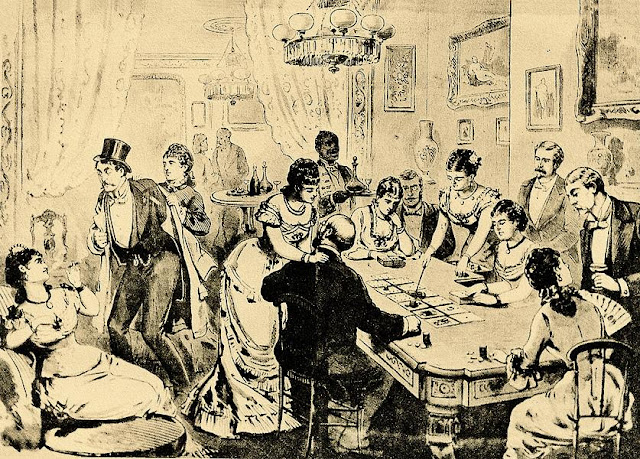"Mother Harris," Brothel Madame?
 |
| The Teller House, one of Colorado’s most famous sporting houses in the 1880s, epitomizes the gambling scene of the "Wild West" in Colorado. [True West Magazine Archives] |
 |
| Polly Pry was an "Adventurous newspaper writer, gossip columnist, and social activist who became one of the first women to run her own newspaper." Photo courtesy of the Denver Public Library |
Polly Pry said that the Denver Pinkerton's office had a file dating back to 1889 on a "Mother Harris"
who was well known in the red-light districts of Denver, Omaha, Kansas City, Chicago, and San Francisco. They also claimed that she leased a house in Denver, brought in the "best looking girls on the row," and ran one of the most notorious brothels in town.
It was concluded by the Pinkertons that Mary Harris was, "vulgar, heartless, vicious creature, with a fiery temper and a cold blooded brutality rare even in the slums."
Most historians out right reject Polly Pry's charges and historian Elliot J. Gorn concludes that they are right to do so. Old friends of Mother, including Terence Powderly, Eugene Debs, and John Mitchell, have exonerated her fully. John Mitchell, president of the United Mine Workers, allegedly asked her to deny the charges and sue for libel or resign from the union. She refused saying that she did not want to dignify the accusations.
 Mother Jones was often called the "miners' angel," for her work. It is interesting to note that this phrase was also often applied to the prostitutes who worked the coal towns. In fact, one of Polly Pry's charged was later confirmed by Upton Sinclair after he asked Mother about the accusations. He wrote:
Mother Jones was often called the "miners' angel," for her work. It is interesting to note that this phrase was also often applied to the prostitutes who worked the coal towns. In fact, one of Polly Pry's charged was later confirmed by Upton Sinclair after he asked Mother about the accusations. He wrote:"...she earned a precarious living and felt herself justified in working for any one who would pay her. She did some sewing for a girl of the street, and this girl died of tuberculosis, and the Catholic church refused her a burial service, and 'Mother Jones' wrote a newspaper to protest against this action - her appearance in public life, her first utterance of radicalism."Mother once hinted that there may be some truth to the accusations. She told UMW organizer Duncan MacDonald, "Don't you think what ever my past might have been that I have more than made up for it?" We know so little about what happened to her between 1871 and 1893 that we can not categorically deny or confirm any of the Polly Pry accusations. My personal belief that that they are mostly false, and part of a broader trend to tear down active women by tarnishing their reputations.
Accusations such as Polly Pry's against Mother Jones were not uncommonly made against women organizing in labor. Women activists were often painted as promiscuous. For a long time, women's participation in protests and marches were discouraged for fear that their presence would make the whole campaign seem immoral. Women of the labor movement, especially, suffered accusations of prostitution, gambling, and drinking.
Mother Jones drew her power from her image as a pure, grandmotherly figure. It only made sense that her opponents would try and darken that image.
`````
Elliot J. Gorn, Mother Jones: The Most Dangerous Woman in America, (New York: Hill and Wang, 2002) 107 - 111

Comments
Post a Comment